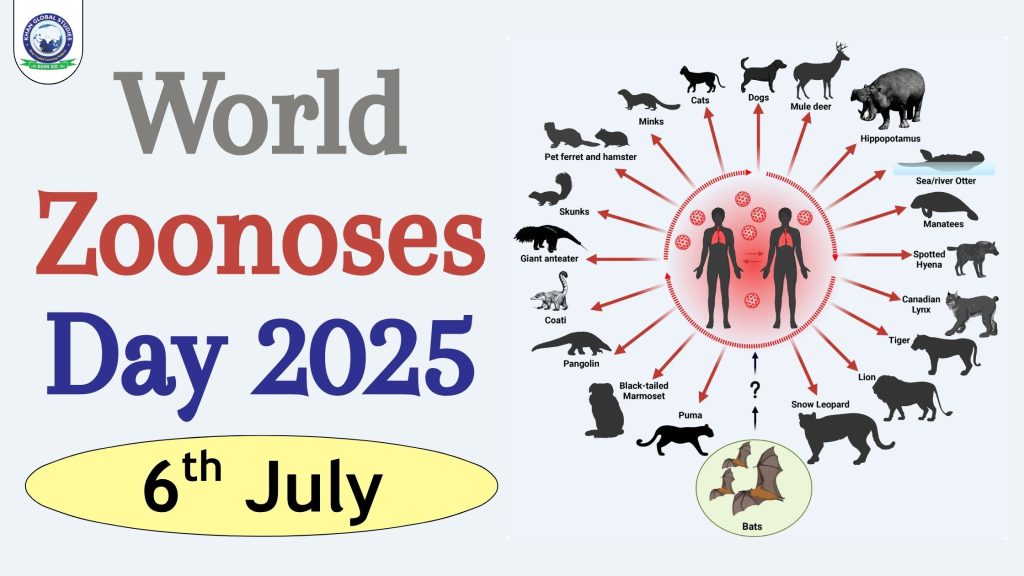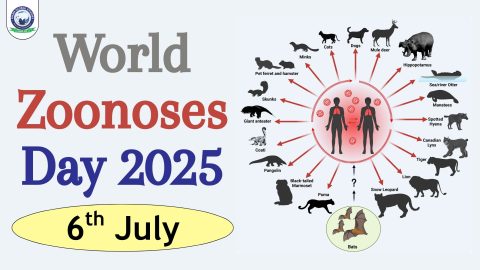World Zoonoses Day 2025, observed on July 6th, is a globally recognized event aimed at spreading awareness about zoonotic diseases—those that spread between animals and humans. As the interconnectedness between humans, animals, and the environment becomes more evident, this day emphasizes the urgent need to recognize and combat the global health risks associated with zoonoses.
What is World Zoonoses Day?
World Zoonoses Day commemorates the day when Louis Pasteur successfully administered the first vaccine against rabies on July 6, 1885. This milestone not only marked a breakthrough in medical science but also laid the foundation for the study and prevention of zoonotic diseases.
Zoonotic diseases include infections like rabies, COVID-19, swine flu, avian influenza, anthrax, brucellosis, leptospirosis, and many others that affect millions globally each year. The observance serves to educate the public, improve animal health systems, and strengthen global efforts to prevent disease spillovers.
World Zoonoses Day 2025 Theme
The theme for World Zoonoses Day 2025 is:
“One Health, One Future: Preventing Zoonotic Outbreaks Together”
This theme underscores the One Health approach, which advocates for the integration of human, animal, and environmental health to prevent the emergence and spread of zoonotic diseases. It calls for collaboration among veterinarians, doctors, researchers, farmers, and policymakers.
History and Origin of World Zoonoses Day
The roots of World Zoonoses Day can be traced back to the scientific accomplishments of Louis Pasteur, a French biologist and microbiologist renowned for developing vaccines against deadly diseases. On July 6, 1885, Pasteur administered a successful rabies vaccine to a 9-year-old boy who a rabid dog—an event that revolutionised modern medicine.
Recognising the impact of this event, global health communities chose this date to commemorate efforts in preventing zoonotic diseases and to honour the scientists, healthcare workers, and veterinarians who continue to fight against these invisible threats.
Significance of World Zoonoses Day
- Spreading Awareness: This day serves as a reminder of the interconnected nature of health and promotes public understanding of how diseases can move from animals to humans, often unnoticed until outbreaks occur.
- Promoting the One Health Approach: By focusing on the One Health strategy, it highlights the necessity of interdisciplinary collaboration across health sectors to combat zoonotic outbreaks effectively.
- Strengthening Surveillance Systems: World Zoonoses Day draws attention to the importance of early detection and response systems, particularly in rural and vulnerable communities.
- Encouraging Vaccination and Prevention: It encourages the vaccination of animals, proper hygiene practices, and responsible animal handling—key steps to breaking the zoonotic transmission chain.
Impact and Effects of World Zoonoses Day
The observance of World Zoonoses Day has led to several tangible outcomes globally:
- Policy Advancements: Many governments use this day to introduce or reinforce public health guidelines, funding for animal vaccinations, and disease monitoring systems.
- Educational Campaigns: Schools, colleges, veterinary institutions, and health organizations host seminars, awareness walks, and webinars to educate the public.
- Community Engagement: In rural areas, outreach programs are conducted to inform farmers and pet owners about disease symptoms and prevention techniques.
- Global Cooperation: The World Health Organization (WHO), World Organisation for Animal Health (WOAH), and Food and Agriculture Organization (FAO) issue joint statements and promote initiatives related to zoonotic risk reduction.
Common Zoonotic Diseases and Their Effects
Here are a few critical zoonotic diseases and how they impact public health:
| Disease | Transmission Source | Human Effects |
| Rabies | Dog, bats, foxes | Neurological failure, death |
| Brucellosis | Cattle, goats, unpasteurized milk | Fever, joint pain, fatigue |
| Leptospirosis | Contaminated water/animal urine | Kidney damage, liver failure |
| Anthrax | Livestock, soil | Skin sores, respiratory collapse |
| Avian Flu | Birds and poultry | Severe respiratory infection |
| COVID-19 | Likely animal origin | Global pandemic, millions affected |
World Zoonoses Day 2025: Quotes to Inspire Action
- “The health of humans, animals, and ecosystems is inextricably linked.”
– World Health Organization - “We cannot prevent the next pandemic without tackling zoonotic diseases at their root.”
– Dr. Maria Van Kerkhove, WHO Technical Lead - “Vaccinate animals. Educate communities. Prevent outbreaks.”
- “A virus knows no boundaries. Neither should our response.”
- “Protecting animal health is a step toward safeguarding humanity.”
How to Observe World Zoonoses Day 2025?
- Participate in Awareness Campaigns: Join local or online events organized by health departments, NGOs, or veterinary clinics to learn more about zoonotic diseases.
- Educate Others: Use social media, webinars, or community meetings to spread awareness, especially in rural or underinformed populations.
- Support the One Health Movement: Advocate for policies and programs that integrate human, animal, and environmental health.
- Practice Safe Animal Handling: Whether you’re a pet owner, farmer, or wildlife worker, ensure animals are vaccinated and that hygiene protocols are strictly followed.
- Promote Research and Innovation: Support institutions and students working in the field of zoonoses prevention, vaccine development, and diagnostics.
Future of Zoonotic Disease Prevention
To reduce the risks of future pandemics, the world must continue to:
- Invest in veterinary public health infrastructure
- Promote sustainable agricultural practices
- Monitor wildlife-human interfaces
- Encourage data-sharing across countries and sectors
- Strengthen local and global disease reporting systems
Only by uniting across disciplines can we truly implement the vision of “One Health” and prepare for a safer, healthier future.
Conclusion
World Zoonoses Day 2025 is not just a date on the calendar but a call to action. It emphasizes the growing threats posed by zoonotic diseases and the urgent need for collaboration across medical, veterinary, and environmental sciences. Through education, surveillance, and responsible policies, we can prevent future outbreaks and ensure a healthier planet for all species.





